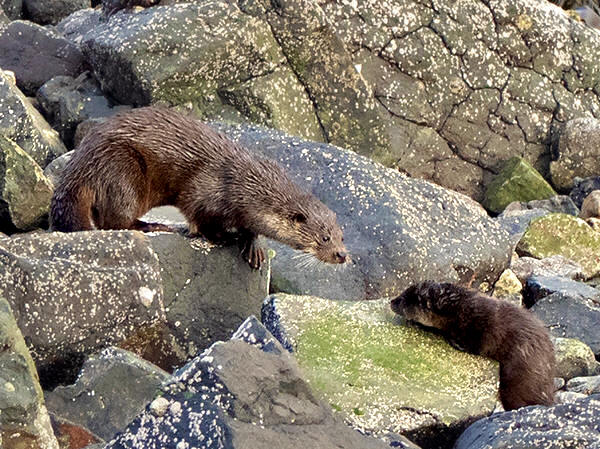 |
Order : CARNIVORA
Family : Mustelidae
Species : Lutra lutra
Head-body length : 55-72 cm
Tail length : 38-48 cm
Weight : 7-12 kg
Lutra lutra
(Eurasian Otter) is a widespread and highly adaptable mustelid whose range stretches
from western Europe and northwest Africa to southern India and Sri Lanka,
the Russian Far East, Korea and China (including Taiwan) and Southeast Asia.
In Southeast Asia
most records are from freshwater habitats in hilly or montane areas in
Vietnam, Laos, Thailand, Myanmar, Sumatra and Borneo(?) (Francis, 2019);
this is the subspecies Lutra lutra barang, one of the smaller forms,
whose numbers are badly impacted by hunting. It appears to be absent from coastal habitats
which are dominated by the
Smooth Otter (Lutrogale perspicillata).
Key features of Lutra lutra barang are summarised in
Francis (2019); these include "upper parts dark brown, with paler chin and
upper throat; fur dense, consisting of short hairs and longer, paler guard
hairs producing a grizzled appearance; end of tail circular
in cross-section".
Shown here are images of a female and cub from the Isle of Skye, Scotland, UK;
females typically raise one or two cubs (occasionally three)
single-handedly, with no assistance from the male in terms of hunting for
food. (This is the nominate
subspecies which extends across much of Europe; after decades of population
decline due to water pollution and hunting, numbers are now on the increase
in many parts of Europe.)
The diet of Lutra lutra is mainly fish and crustaceans,
however there is a high degree of plasticity in its adaptation to available
food sources, and other vertebrates may be consumed including amphibians,
reptiles and small mammals (Roos et al, 2021).
Figs 1 to 3 : Female Eurasian Otter with a single cub,
observed on the Isle of Skye, Scotland, UK, in rocky coastal habitat
with abundant seaweed and kelp growth. These images show some
identifying features of the species, including dark brown fur with pale chin and throat,
a rough, grizzled appearance due to stiffer guard hairs, and the end of the tail being circular in cross-section.
All photos thanks to Vivienne Davies.
References :
Francis, C. M. (2019). A Field Guide to the Mammals of South-east Asia.
Second Edition. New Holland. 416 pp.
Roos, A., Loy, A., Savage, M. & Kranz, A. 2021. Lutra lutra. The IUCN
Red List of Threatened Species 2021: e.T12419A164578163.
Links :
IUCN Otter
Specialist Group
International Otter Survival
Fund |